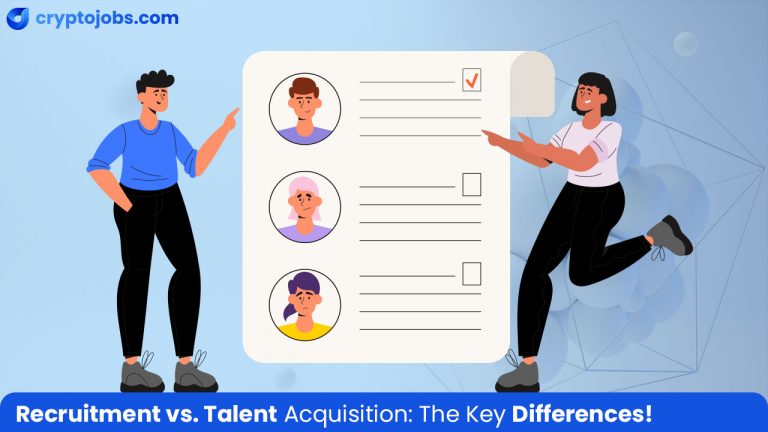
Recruitment vs. Talent Acquisition: Understanding the Difference
- cryptojobs.com
- October 2, 2023
- All Posts, Career Guide
- Recruitment, Talent acquisition
- 0 Comments
Many people often mix up the two terms “recruitment” and “talent acquisition”. The answer to whether these terms are exactly same is ‘No.’
While both pertain to filling vacancies, the strategies, scope, and objectives vary significantly.
Whether you’re an HR professional or a job seeker on a lookout for talent acquisition jobs in the crypto industry, understanding these differences is extremely important.
Our blog post aims to debunk the confusion and delve into the nuances that distinguish these two critical HR functions.
Let’s dive in!
Defining Recruitment and Talent Acquisition Jobs
Fundamentally, both recruitment and talent acquisition focus on filling job vacancies. However, their approach and scope are quite different.
Recruitment is a reactive, thorough process, that focuses on filling a immediate vacancy. It involves:
- Identifying a job opening,
- Advertising it,
- Inviting applications,
- Screening,
- Shortlisting candidates,
- Conducting interviews,
- Selecting & hiring the right candidate.
Recruitment is short-term and transactional.
Talent acquisition, on the other hand, is a strategic and long-term approach of HR professionals. It involves:
- Understanding the organization’s long-term goals
- Understanding hiring needs
- Proactively seeking candidates to help achieve them.
- Building relationships with potential candidates,
- Creating a talent pipeline for future vacancies,
- Focusing on finding the right fit for the job and the company culture.
- Attracting and retaining high-quality individuals who can contribute to the organization’s growth.
In a nutshell, recruitment is transactional, whereas talent acquisition is transformational. Also, while recruitment is about filling vacancies, talent acquisition is about building a workforce for years to come in an organization.
Advantages of Talent Acquisition Jobs Over Recruitment
Talent acquisition is rapidly becoming the go-to method for organizations looking to hire top talent. Unlike traditional recruitment practices, talent acquisition jobs put greater emphasis on building employer branding and actively seeking out the best candidates in the market.
Long-Term Strategy
Talent acquisition is a forward-looking strategy. It aligns with your company’s long-term goals, ensuring you’re filling positions and building a strong talent pipeline for the future.
Strategic Aims
This approach in talent acquisition jobs is more strategic, enabling businesses to identify and attract high-performing individuals who can add value to their organization.
Quality Over Quantity
Talent acquisition focuses on attracting high-quality candidates who can contribute significantly to your organization’s growth. It’s about finding the perfect fit for your company, both skill-wise and culture-wise.
Employer Branding
A key part of talent acquisition is building a strong employer brand that attracts top-tier candidates. It positions your company as an ‘employer of choice,’ making attracting and retaining high-caliber talent easier.
Relationship Building
Talent acquisition job isn’t just about hiring; it’s about cultivating relationships. By connecting with potential candidates, even when there are no immediate vacancies, you create a network of talent that can be tapped into when needed.
Reduced Turnover
By focusing on the right fit from the start, talent acquisition can lead to lower employee turnover rates. Employees are more likely to stay when they resonate with the company’s values and see growth opportunities.
Cost-Effective
While talent acquisition may require more resources upfront, it can save costs in the long run by reducing hiring mistakes and turnover rates.
In essence, talent acquisition is like playing chess. It requires strategic thinking, foresight, and a deep understanding of your organization’s needs. It’s not just about winning the immediate game – it’s about setting yourself up for sustained success.
Summing Up
Simply put, understanding the differences between recruitment and talent acquisition can help companies find the best people for their team. Talent acquisition is more than just looking at skills and experience, it’s about finding people who fit well with the company’s culture.
Plus, using technology can make the hiring process easier and let recruiters and remote talent acquisition jobs focus on other important things.
In the long run, prioritizing talent acquisition can reap enormous rewards for companies.




